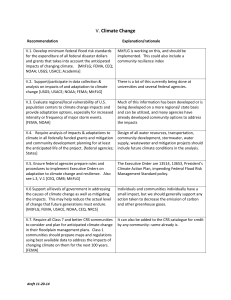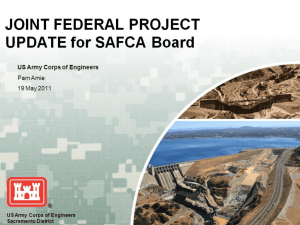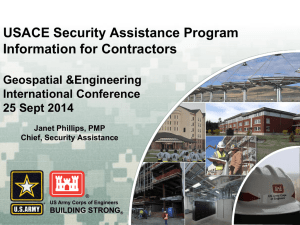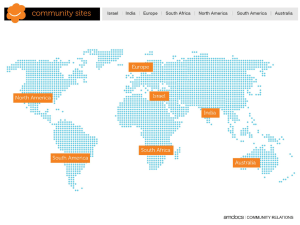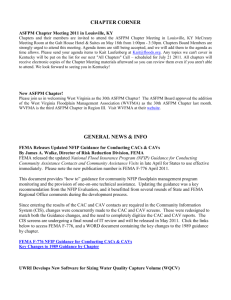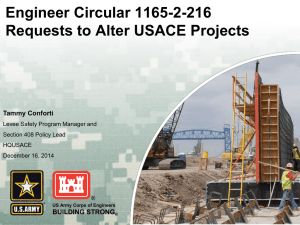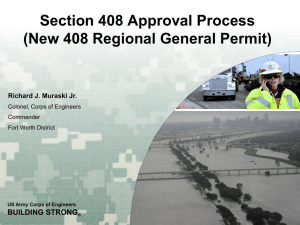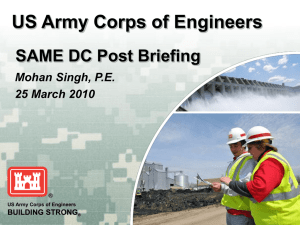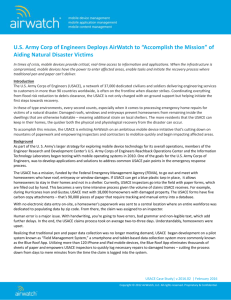Electric Power
advertisement
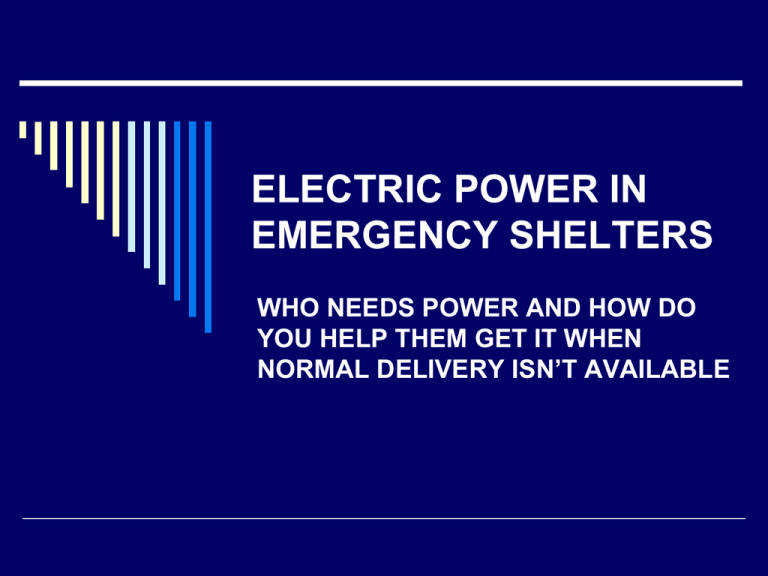
ELECTRIC POWER IN EMERGENCY SHELTERS WHO NEEDS POWER AND HOW DO YOU HELP THEM GET IT WHEN NORMAL DELIVERY ISN’T AVAILABLE FOCUS Electric power is as important as clean drinking water in the eyes and minds of many people today. Today, a consistent source of electrical power allows a majority of us to enjoy many ‘creature’ comforts in our lives. But for others, including likely shelter residents, electrical power is life- sustaining as well as supporting their independence. FOCUS-(cont’d) A list of commonly-use equipment in many peoples’ daily lives dependent on electrical power is vast. Many items maybe comfort, educational or recreational in nature. For many, some devices are the ‘fabric’ of their independent living and need to be supported. Being ‘inconvenienced’ isn’t the issue or an option. FOCUS-(cont’d) Mobility devices, ventilators, suctioning devices, refrigerators for medicines and communication equipment make up a majority of the required equipment needing reliable electrical power. There will be other devices not mentioned above that are used by members of your shelter population that you will need to support. GOALS Serious discussions with all responsible parties who support shelter operations in your jurisdiction about this need. Documented and tested plans of action for the delivery of electrical power for use by shelter residents following an emergency for the public good. OBJECTIVES Solicit input from all stakeholders. Establish milestones and a timeline for completion of actions, where possible. Over communicate the final plan. Provide timely updates on the progress of implementation. Final report to all stakeholders. Don’t ‘sugarcoat’ the results. SHELTER POWER TASKFORCE Senior Elected Official Emergency Management Fire Service Law Enforcement Health Services Public Works Utilities-(public & private) Sheltering partners Facility representatives Disabilities community SHELTER POWER TASKFORCE-(cont’d.) Medical equipment vendors-(those who rent/repair on-site especially) Telecommunications rep-(phone, internet, TV, data services) Care & Shelter Lead for the jurisdiction-(Parks & Recreation, Health & Human Services, Public Social Services) Communications rep Electrical contractors’ rep WHAT’S AT STAKE Medical concerns Additional reliance on limited human resources Liability Reputation WHAT’S AT STAKE (cont’d.) Understanding the limitations Prioritization Public opinion Cost A PORTABLE GENERATOR IN USE Dan Goede, an emergency management volunteer with the City of Federal Way, starts up the new power generator Tuesday at St. Vincent de Paul Church.— Image Credit: Andy Hobbs/The Mirror Senator Brown and Susan W. Pope at Wayland’s primary emergency shelter generator that is now on-line. The $225,000 spent provides electrical power to provide heat, hot water and hot food for those in need. Wayland was the only town of 15 in Mass. to be awarded funding that applied for it. Back-up Building Generator SO WHAT DOES THIS MEAN Jurisdictions and their shelter partners need to work to identify shelter sites that have back-up power on-site or can bring in the required equipment to provide power. But what you are asking is… Difficult Not possible Takes a lot of time Is too expensive Is not my job We have too many sites Too much to manage The buildings are too old The buildings are too far away The owners won’t let us We don’t know where to start All those are possible answers following a disaster, none of them may be acceptable. So start working on it now and chip away at your list of priority sites and see what it takes. You may find by asking around, some solutions may be easy to come by. No jurisdiction has all the answers. But not attempting to get answers and solving the problem will have you in a much worse place than trying. You may find that some solutions are within your grasp. An example might be a portable generator properly and safely setup in the parking lot to allow power chair charging. Some users may have their chargers with them and may share them with others. Setting up ‘charging stations’ inside the shelter for cell phones and other mobile communication devices. The Federal Emergency Management Agency- (FEMA) working with the United States Army Corps of Engineers-(USACE) has a program to assist jurisdictions with site surveys for back-up power. This can be a resource you take advantage of before a disaster to help you plan and prepare for when one occurs. Hint: the next slides will help… FEMA/USACE HAS A PLAN Emergency Power Mission Capabilities: USACE has the capability to provide local and state officials broad support for their unmet temporary emergency power needs. This support ranges from technical expertise/assistance through complete management of an emergency power mission including the procurement, installation and operation of generators. USACE assets include elements of the U.S. Army 249th Engineer Battalion “Prime Power”, Emergency Power Planning & Response Teams (PRTs) from across USACE, USACE-contracted forces, and USACE Deployable Tactical Operations System (DTOS) for communications. USACE also coordinates with other federal partners such as the Federal Emergency Management Agency (FEMA) and the Department of Energy (DOE). These assets can provide Technical Assistance before, during and after an event, which includes, but is not limited to: Assessing emergency power requirements needed at a facility. Assessing conditions and capabilities of existing emergency generation equipment. Troubleshooting, repair, & operation of emergency generation/distribution equipment. Installation, operations, fueling and maintaining emergency power generation equipment. Safety inspections of electrical distribution systems and equipment. Assessing damaged electrical distribution systems and equipment. Assessing conditions and capabilities of existing emergency generation equipment and power planning. The execution of a power mission in an emergency involves the combined efforts of the 249th, the Power PRT, DTOS, the ACI contractor, and our state and federal partners. During these missions, the Technical Assistance items discussed above are brought to bear along with the following: Provide assistance to state and local officials in determining priorities for assessing and installing generators at critical public facilities. Assessing facilities to determine suitability for a generator, location for its placement and matching with the correct generator configuration. Preparation, hauling, and installation of generator. Operation, fueling, service, and maintenance of installed generators. De-installation and return of generators. This can also include remediation of the generator installation site to its pre-installation site condition. Service, maintenance, and repair of generators prior to their return to long-term storage to ensure they are Fully Mission-Capable (FMC). This may also include load testing. Replenishing any Bill of Materials (BOM) used during execution of the mission. Operational maintenance of FEMA generators is performed by a combination of 249th, PRT, and contractual support Generator procurement and/or leasing can be performed by USACE through a contracting team which has pre-established contracting tools. Purchase of generators during disaster response should be avoided if possible. The USACE pre-established contracts allow leasing and rental of generators if the FEMA inventory cannot satisfy needs. Historically, most generators purchased during disaster responses required extensive modifications to meet FEMA acceptance criteria to be included into their inventory. During Emergency Power response activities, facilities requiring generators are typically prioritized in the following order: 1. Life Saving Facilities. (911 centers, police, fire stations, and medical facilities) 2. Life Sustaining Facilities. (water and wastewater treatment and pumping facilities) 3. Other municipal facilities to reinstitute local command and control and post-event recovery. Emergency Power Video: www.youtube.com/watch?v=cOGaPwlxu0w EMERGENCY POWER INFORMATION Emergency Power Contracting: The Advance Contracting Initiative (ACI) Contracts serve specific FEMA regions as shown below. Contract Area Serving FEMA Regions/Territories I, II, III, IV, V, Puerto Rico, and the Virgin Islands II VI, VII and VIII III IX, X, Alaska, Hawaii, and Guam. Contact HQUSACE USACE Proponent Contract Information; Mr. Pete Navesky, Dave Bishop, T.J. Fichera-Permanent Cadre Member Emergency Power SME District Chief, EM/Emergency Power SME Peter.Navesky@usace.army.mil David.A.Bishop@usace.army.mil Thomas.J.Fichera@usace.army.mil Locally, the City of Los Angeles Emergency Management Department is working with the US Army Corps of Engineers to survey Cityowned facilities to determine their status and possible needs when a major disaster occurs. Other members of the ‘City family’ taking part are the Dept. of Building and Safety and dept. of Water and Power. A very special ‘thank you’ to June Kailes for the invitation to speak on this topic. And thank you to all the agencies and individuals who have and continue to support the American Red Cross.
